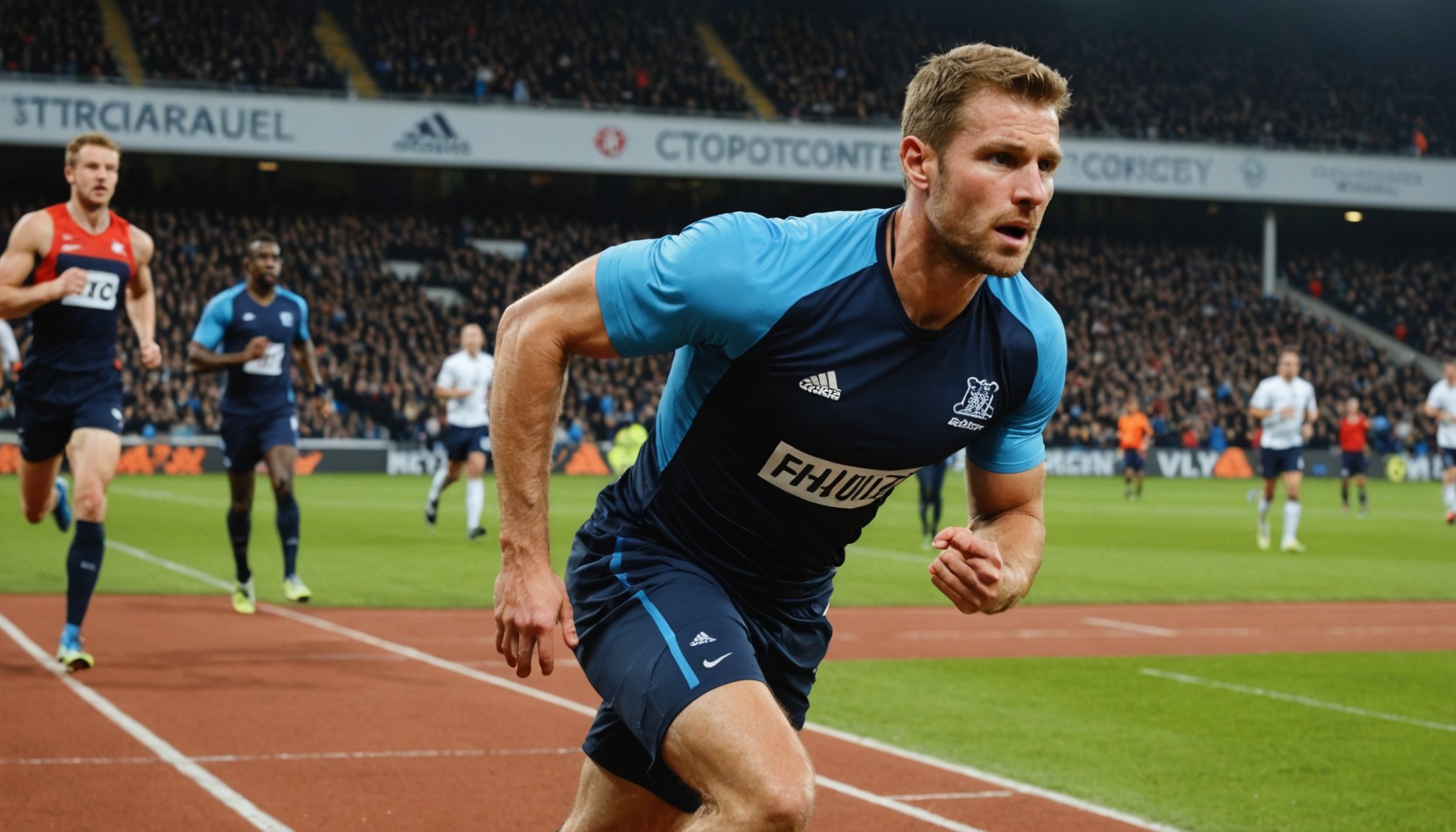Unlocking Athlete Potential: The Role of UK Sports Psychologists in Conquering Performance Anxiety
Understanding Performance Anxiety in Sports
Performance anxiety, often referred to as the ‘yips’ or ‘choking,’ is a common phenomenon that affects athletes across various sports. It is characterized by an intense fear of failure, which can significantly impact an athlete’s performance and overall well-being. This anxiety can manifest in different ways, such as increased heart rate, sweating, and a inability to focus, all of which can hinder an athlete’s ability to perform at their best.
To understand the scope of this issue, consider the example of a professional golfer who, despite years of practice and success, suddenly finds themselves unable to make a simple putt due to overwhelming anxiety. This situation highlights the need for specialized help, which is where sports psychologists come into play.
Also to read : Elevating Squash Skills: Leveraging Technology for UK Players to Enhance Shot Precision
The Role of Sports Psychologists
Sports psychologists play a crucial role in helping athletes manage and overcome performance anxiety. Here are some key ways they contribute:
Assessing and Identifying Anxiety
Sports psychologists use various assessment tools to identify the sources and levels of anxiety in athletes. This could involve psychological questionnaires, interviews, and observations during training and competitions.
In parallel : Unlocking Player Potential: Leveraging Data Analytics for Enhanced Performance in UK Sports Teams
Developing Mental Skills
One of the primary tasks of sports psychologists is to help athletes develop mental skills that enhance their resilience and performance. Here are some of the key mental skills they focus on:
- Goal Setting: Helping athletes set realistic and achievable goals, both short-term and long-term, to maintain focus and motivation.
- Self-Confidence: Building self-confidence through positive self-talk, visualization, and reinforcement of past successes.
- Mental Toughness: Teaching athletes to handle pressure and stress through techniques such as deep breathing, relaxation, and positive thinking.
- Focus and Concentration: Training athletes to maintain their focus under pressure using techniques like mindfulness and attention training.
Using Psychological Interventions
Sports psychologists employ a range of psychological interventions to help athletes manage anxiety. Here are a few examples:
- Cognitive Behavioral Therapy (CBT): This involves identifying and changing negative thought patterns that contribute to anxiety.
- Hypnotherapy: Using hypnosis to induce a state of deep relaxation and suggest positive behaviors and thoughts.
- Mindfulness and Meditation: Teaching athletes mindfulness techniques to reduce stress and improve mental clarity.
Practical Strategies for Managing Performance Anxiety
Here are some practical strategies that sports psychologists recommend for managing performance anxiety:
Pre-Performance Routines
Establishing a consistent pre-performance routine can help athletes feel more in control and prepared. This could include activities like stretching, visualization, or listening to music.
Positive Self-Talk
Encouraging positive self-talk is crucial. Athletes should focus on affirming their abilities and past successes rather than dwelling on negative thoughts.
Breathing Techniques
Deep breathing exercises can help reduce physical symptoms of anxiety such as rapid heart rate and sweating.
Visualization
Visualizing successful performances can boost confidence and reduce anxiety. Athletes can imagine themselves performing well and overcoming challenges.
Case Studies and Success Stories
To illustrate the effectiveness of sports psychology in managing performance anxiety, let’s look at a few case studies:
The Case of a Professional Tennis Player
A professional tennis player was struggling with performance anxiety, particularly during critical points in matches. With the help of a sports psychologist, she developed a pre-serve routine that included deep breathing and positive self-talk. She also practiced visualization techniques to imagine herself winning points and matches. Over time, she noticed a significant reduction in her anxiety levels and an improvement in her overall performance.
The Case of a Young Footballer
A young footballer was experiencing stress and anxiety before matches, which affected his performance on the field. His sports psychologist introduced him to mindfulness and meditation techniques to manage his stress levels. The psychologist also helped him set realistic goals and develop a positive mindset. As a result, the young footballer saw an improvement in his game and a reduction in his pre-match anxiety.
Quotes from Experts
- “Performance anxiety is a common issue in sports, but it’s not insurmountable. With the right strategies and support, athletes can learn to manage their anxiety and perform at their best.” – Dr. Emma Ross, Sports Psychologist, UK.
- “Mental skills training is as important as physical training for athletes. It helps them develop the resilience and confidence they need to succeed under pressure.” – Dr. Chris Harwood, Sports Psychologist, UK.
Comparative Table: Traditional Training vs. Sports Psychology
| Aspect | Traditional Training | Sports Psychology |
|---|---|---|
| Focus | Primarily on physical skills | On mental and emotional well-being |
| Techniques | Drills, conditioning, and physical practice | Cognitive behavioral therapy, hypnotherapy, mindfulness, and visualization |
| Outcomes | Improved physical performance | Enhanced mental resilience, reduced anxiety, and improved overall performance |
| Coaches | Typically physical coaches or trainers | Trained sports psychologists |
| Tools | Equipment, training facilities | Psychological assessments, mental skills training programs |
Detailed Bullet Point List: Mental Skills Training
Here is a detailed list of mental skills that sports psychologists help athletes develop:
-
Goal Setting:
-
Short-term and long-term goals
-
SMART (Specific, Measurable, Achievable, Relevant, Time-bound) goals
-
Breaking down large goals into smaller, manageable steps
-
Self-Confidence:
-
Positive self-talk
-
Visualization of past successes
-
Reinforcement of strengths and achievements
-
Mental Toughness:
-
Handling pressure and stress
-
Deep breathing and relaxation techniques
-
Positive thinking and affirmations
-
Focus and Concentration:
-
Mindfulness and attention training
-
Pre-performance routines to maintain focus
-
Strategies to avoid distractions
-
Resilience:
-
Coping with setbacks and failures
-
Learning from mistakes
-
Maintaining a positive attitude despite challenges
-
Teamwork and Communication:
-
Building strong team dynamics
-
Effective communication with teammates and coaches
-
Supporting and motivating teammates
Performance anxiety is a significant challenge that many athletes face, but with the help of sports psychologists, it is possible to overcome. By developing mental skills, using psychological interventions, and adopting practical strategies, athletes can enhance their performance and achieve their full potential.
In the UK, sports psychologists are playing a vital role in helping athletes manage anxiety and improve their mental health. Their work is not just about fixing problems but also about enhancing overall well-being and performance.
As Dr. Emma Ross, a sports psychologist in the UK, puts it, “The mental game is just as important as the physical game. By focusing on both, athletes can achieve a level of performance they never thought possible.”
Whether you are a professional athlete or an amateur enthusiast, understanding the role of sports psychology in managing performance anxiety can be a game-changer. So, the next time you step onto the field or court, remember that your mental health and resilience are just as crucial as your physical skills.













